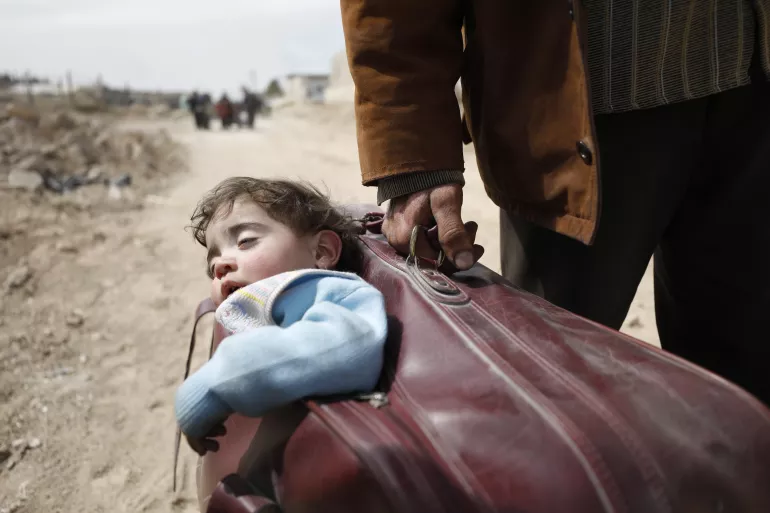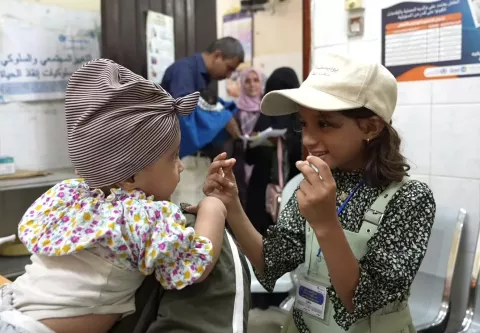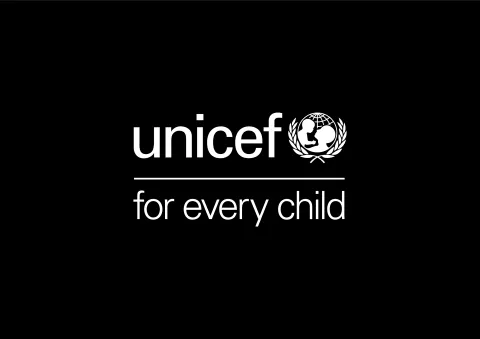Today’s wars on children devastate the sacred principle of protection
Op-Ed by, UNICEF Regional Director, Geert Cappelaere

Geert Cappelaere*
March 2018
A few milestones this month…
Seven years of war on children in Syria
Three years of war on children in Yemen
Who marks those milestones?
Who cares?
The gradual erosion of public consciousness for our common duty to protect children seems to have made the world numb to egregious violations. What’s worse, we seem to be blind to the fact that the world of the future will be populated with humans – 1 in 5 children who live in conflicts in the Middle East and North Africa today - who have first-hand experience of an international system that does not protect its most vulnerable members and allows those who attack children to continue to profit from these acts.
The wars in Syria and Yemen are the acceleration of this loss of common consciousness. The lack of public outrage on a large scale today, when children are being attacked and when it is impossible to claim ignorance of what is taking place, is a bleak indicator. The lack of effective political action, even worse.
Seven years ago, at the onset of a war that is still raging, two children were killed in Syria, sparking a wave of protest. Four years later, another brutal war erupted in Yemen. In 2014, the world’s consciousness was supposed to be shaken when 1 million children from Syria became refugees. Today, they are 2,5 million. In Yemen, a child died every 10 minutes from preventable diseases. Celebrated progress was dramatically reversed through outbreaks like polio, cholera and diphtheria. In 2016, we stated that the suffering of children in Syria and Yemen had hit rock bottom and couldn’t possibly get worse. But 2017 turned out to be far more brutal with more than 2,000 children verified killed or maimed for life. The actual numbers are likely to be much higher. Images from these conflicts are everywhere. Some have gone “viral”: Aylan, the three-year old Syrian boy washed up on a beach while trying to reach safety; Omran, a five-year old, shell-shocked in an ambulance, his face full of dust from his bombed-out house in Aleppo; Buthaina, the bruise-faced girl from Yemen, tiny babies with eyes wide-open leaving this world because of man-made hunger.
In 1989, the World adopted unanimously the International Convention on the Rights of the Child.
Where has that political leadership gone?
The last seven years shall go down in history as an unprecedented ‘war on children’. A vicious race to the lowest point of horror, of killing, of brutality.
The wars in Syria and Yemen are only examples where the very basic principle of protection of children is being disregarded every single minute of every single day. There are many other conflicts or situations of extreme violence across the world, but with the same or similar cruelties for children.
Those directly accountable for this war on children; those supporting conflict and extreme violence indirectly; those condoning or standing by are sweeping aside values and laws that bind our common humanity: rules and principles of international human rights and humanitarian law that protect children under all circumstances; obligations that States committed to respect decades ago.
In today’s world, these laws, these principles and with them our human values are more critical than ever before. The protection of children under all circumstances is non-negotiable. The war on children, the war on humanity, is not an option!
UNICEF and the child protection community will continue making the voices of children heard and tirelessly advocate for the sacred child protection principle to be respected. In absence of political leadership, what else is there that each of us can and should do?
Our efforts on their own will never stop the war on children.
ENDs-
*Geert Cappelaere is the UNICEF Regional Director for the Middle East and North Africa.
Media contacts
About UNICEF
UNICEF promotes the rights and wellbeing of every child, in everything we do. Together with our partners, we work in 190 countries and territories to translate that commitment into practical action, focusing special effort on reaching the most vulnerable and excluded children, to the benefit of all children, everywhere.
For more information about UNICEF and its work for children, visit www.unicef.org/mena




